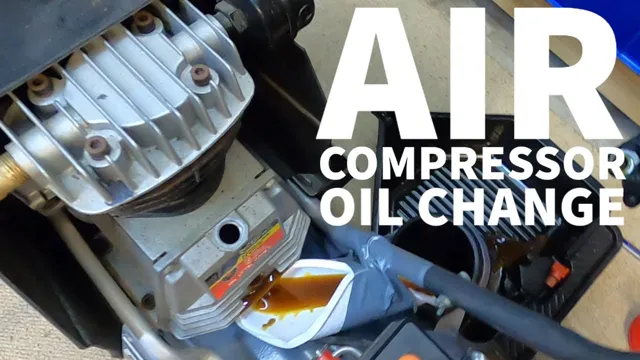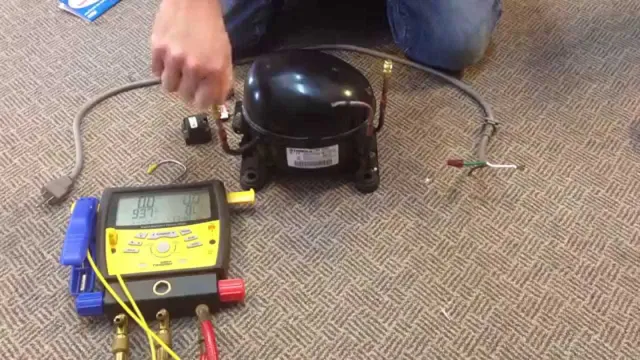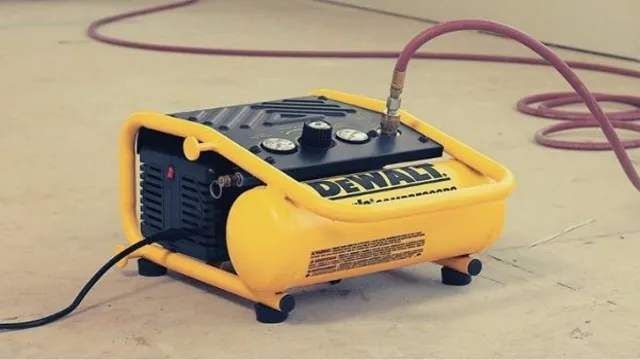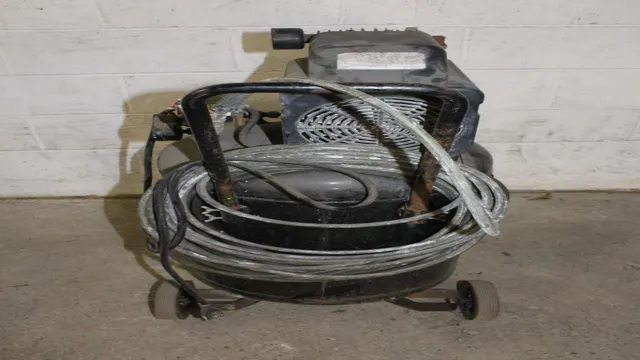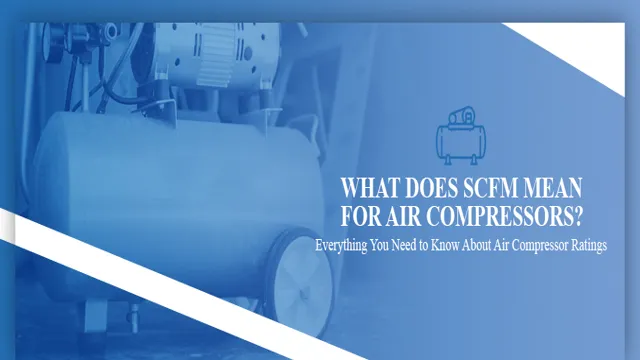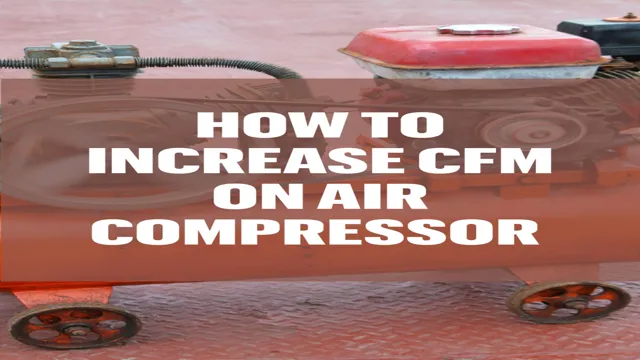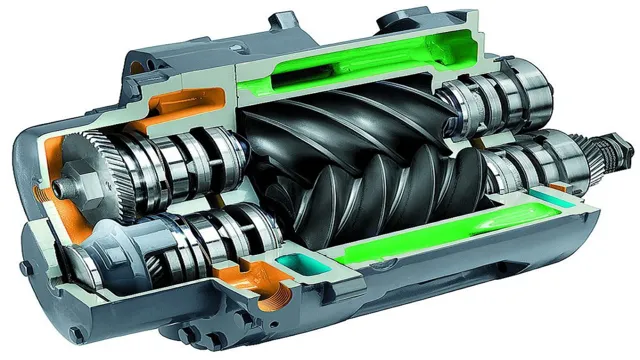Do Air Compressor Tanks Expire? Here’s Everything You Need to Know.
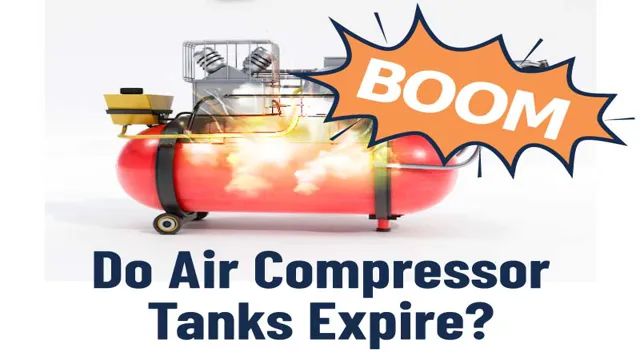
You’ve had your air compressor for a while now, and you can’t help but wonder: do air compressor tanks expire? It’s a valid question to ask, as any piece of equipment eventually reaches its end of life. However, it’s not a straightforward answer. Air compressor tanks do not necessarily have an expiration date, but that doesn’t mean they last forever.
A tank’s lifespan will depend on several factors, such as its material, use, and maintenance. In this blog post, we’ll dive into the details of air compressor tanks and help you determine if it’s time to replace yours.
Understanding Air Compressor Tanks
Many people wonder if air compressor tanks expire after a certain period of time. The answer is no, they don’t, but that doesn’t mean that they last forever. Just like any other mechanical equipment, air compressor tanks have a limited lifespan.
The amount of time they last depends on how well they are maintained and used. A tank that is well-maintained and not used excessively can last for many years, while a tank that is neglected and used frequently may only last for a few years. It’s important to regularly check your air compressor tank for any signs of damage or wear and tear, such as rust or leaks, and to replace it if necessary.
In the end, the lifespan of an air compressor tank depends on the quality of the tank itself and how well it is cared for.
What are air compressor tanks?
Air compressor tanks are an essential component of any air compressor system, providing a reservoir of compressed air. These tanks are designed to store compressed air at high pressure, which is then released on demand to power tools or other equipment. Understanding air compressor tanks is critical when selecting a compressor, as the size and type of tank can significantly impact the air compressor’s performance.
Larger tanks can hold more compressed air, reducing the compressor’s workload, and extending its lifespan. However, it’s essential to note that larger tanks also require more space and are less portable. When selecting an air compressor tank, it’s crucial to consider your specific needs and workload, ensuring you get the right size and type of tank for your needs.
By understanding air compressor tanks and their benefits, you can make an informed decision when choosing the right air compressor system for your needs.
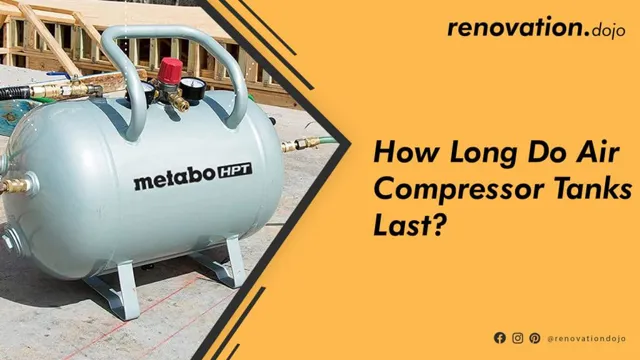
How do they work?
Air compressor tanks are an essential component of any air compressor. They work by storing compressed air that is generated by the compressor. The tanks are designed to hold a certain amount of air, which is expressed in terms of gallons.
The size of the tank you need will depend on the workload you intend to use it for. A larger tank will provide more air for an extended period, while a smaller one will work for lighter tasks. The tank’s function is simple: it stores the compressed air, so it’s available when needed, regardless of the compressor’s flow rate.
Essentially, the tank acts as a reservoir that holds a compressed air reserve ready for use. To ensure the tank is working correctly, one should check the tank’s pressure gauge, which displays the level of pressure inside the tank. When the pressure falls below the recommended level, the compressor will kick in to recharge the tank.
Compressor tanks can be made of metal or aluminum, and most compressor tanks are designed to last for years with careful handling and regular maintenance.
Types of air compressor tanks
Air compressor tanks come in a variety of sizes, shapes, and materials. It’s important to understand the different types of air compressor tanks available, so you can choose the best one for your needs. Vertical tanks are the most common type and can hold more air while taking up less floor space.
They’re ideal for smaller shops or garages where space is limited. Horizontal tanks are great for larger volume needs but take up more room. Specialty tanks, like pancake and twin-stack, are designed for portable use and are easier to move around.
Material-wise, tanks can either be made from steel or aluminum. Steel tanks are more durable and can withstand more abuse than their aluminum counterparts. Overall, the type of air compressor tank you choose will depend on your specific needs and intended use.
Factors that Affect Air Compressor Tank Life
Many factors contribute to the lifespan of an air compressor tank. While some tanks last for decades, others may expire prematurely. One factor to consider is the type of material used for the tank’s construction.
Steel tanks tend to last longer than aluminum tanks, as they are more resistant to corrosion and less prone to fatigue. However, the quality of the steel used can also impact its lifespan. Another key factor is maintenance.
Proper upkeep can significantly extend the life of an air compressor tank, such as draining the tank regularly to prevent moisture buildup that can lead to corrosion. Additionally, overfilling the tank can cause it to burst, so it is important to follow manufacturer guidelines and not exceed the tank’s capacity. A third factor to consider is the conditions in which the tank is used.
High temperatures and constant pressure can increase wear and tear on the tank, shortening its lifespan. Regular inspections of the tank’s condition can help identify any issues early on and prevent catastrophic failures from occurring. So, while air compressor tanks do not necessarily have an expiration date, taking these factors into consideration can help ensure that they last as long as possible.
Quality of the tank
When it comes to air compressors, the quality of the tank is one factor that greatly affects its lifespan. High-quality tanks are made from durable materials, such as steel, and are built to withstand high levels of pressure and stress. Cheaper tanks, on the other hand, are made from inferior materials and may have weak points or flaws that can lead to leaks or even cracks.
In addition, the size of the tank can also impact its lifespan since smaller tanks tend to wear out faster due to the need to cycle more frequently. Investing in a high-quality, sturdy tank is essential for ensuring a long lifespan for your air compressor. By doing so, you can avoid costly repairs or replacements and enjoy efficient performance for years to come.
So, if you’re shopping for an air compressor, make sure to pay attention to the quality of the tank to ensure the longevity of your investment.
Type of gas compressed
One of the major factors that can impact the life of an air compressor tank is the type of gas that is being compressed. Different gases have different chemical properties, which can affect the tank differently. For example, some gases may be corrosive and could cause the tank to rust, while others may cause the tank to become brittle and crack.
It is important to consider the type of gas that you will be compressing before selecting a compressor tank and to ensure that the tank is designed to handle the gas safely and effectively. Additionally, regular maintenance and inspections can help to identify any issues with the tank before they become more serious and can help to extend the life of the tank. Ultimately, choosing the right type of tank and taking care of it properly can help to ensure that your compressor continues to function optimally and provides reliable performance for years to come.
Environmental factors
Air compressor tank life can be affected by a number of environmental factors. Firstly, high levels of humidity can cause corrosion on the tank’s interior and reduce the overall lifespan. This is because water can accumulate inside due to condensed moisture, leading to rust and eventually, failure of the tank.
Extreme temperatures, either hot or cold, can also add to the wear and tear of the tank’s exterior, as well as increase the risk of condensation forming. Additionally, exposure to chemicals and pollutants can impact the lifespan of an air compressor tank, as they can cause degradation of the tank’s material. It’s important to consider these factors when purchasing an air compressor and storing it in a suitable environment to maximize its lifespan and ensure a safer working environment.
By taking these environmental factors into account and performing regular maintenance, such as draining accumulated moisture, you can ensure that your air compressor tank retains its durability and reliability.
Frequency of use
Air compressor tank life is determined by various factors, including the frequency of use. If an air compressor is used frequently, its tank is more likely to wear out quickly. On the other hand, if an air compressor is used less frequently, its tank can last longer.
This occurs because air compressors function by pressurizing air into tanks, which can cause corrosion and rust buildup over time. Regular usage could lead to more rapid corrosion, possibly compromising the tank’s function, but infrequent usage increases the risk of water accumulation, leading to rust formation. Therefore, regardless of frequency of use, It is crucial to maintain the air compressor tank properly by draining any accumulated water and checking for any leaks regularly, prolonging the tank’s lifespan.
When to Replace Air Compressor Tanks?
If you own an air compressor, there may come a time when you start to wonder whether it’s time to replace the tank. The short answer is yes, air compressor tanks do expire. Most tanks are made of steel, which means that over time they can rust and corrode, weakening the structure of the tank.
This can make the tank more prone to leaks and even burst. The lifespan of an air compressor tank can vary depending on several factors, such as how often it’s used and how well it’s maintained. Experts generally recommend replacing the tank every 10 to 15 years or if you notice any signs of wear and tear, such as rust, dents, or cracks.
It’s always better to err on the side of caution when it comes to air compressor tanks, as a burst tank can be dangerous and cause serious injury or property damage.
Warning signs of a failing tank
If you own an air compressor, it’s essential to know when to replace the tank. While these tanks are built to last, they do experience wear and tear over time, which can lead to serious problems down the line. One of the most common warning signs of a failing tank is slow air pressure buildup.
If it takes longer than usual for your compressor to reach the desired pressure, or if the pressure drops quickly when the compressor is turned off, it’s time to start thinking about replacing the tank. Another red flag is rust or corrosion on the tank. This can weaken the integrity of the tank and potentially lead to bursting, which is a serious safety hazard.
If you notice rust or corrosion on the tank, it’s best to replace it as soon as possible. Other warning signs to look out for include leaks, strange noises, or visible damage to the tank. Remember, it’s always better to be safe than sorry when it comes to air compressor tanks.
Don’t wait until a problem occurs – keep an eye out for these warning signs and replace your tank as needed.
Routine maintenance and inspection
Air compressor tanks are essential components of any compressed air system. They are responsible for holding compressed air and regulating pressure levels. Over time, these tanks may become damaged or corroded, which can lead to a decrease in performance and even pose a safety risk if left unchecked.
Routine maintenance and inspection can help to catch these issues early on and make necessary repairs before they become more serious. But when is it time to replace an air compressor tank? As a rule of thumb, if a tank is more than 15 years old, it may be time to consider a replacement. Additionally, look for signs of rust, corrosion, or leaks around the tank and its connections.
These can be indications that the tank is no longer safe to use and should be replaced immediately. By keeping up with regular maintenance and inspections, you can ensure that your air compressor tanks are in good working order and avoid potential safety hazards down the line.
Conclusion
In conclusion, while air compressor tanks may not have a literal expiration date stamped on them, it’s important to keep an eye on their overall condition and use common sense when operating them. Just like a carton of milk, a tank that’s past its prime can cause some serious issues. So, take good care of your tank and it’ll take good care of you.
“
FAQs
1. What is the lifespan of an air compressor tank?
The lifespan of an air compressor tank varies depending on usage and maintenance but most tanks have a lifespan of around 20-30 years.
2. Can you use an expired air compressor tank?
No, using an expired air compressor tank can be dangerous and can result in the tank rupturing or exploding, causing severe injury or even death.
3. How can I determine the expiration date of my air compressor tank?
Look for a date stamp or manufacturer information on the tank. If the tank is over 10 years old, it’s recommended to have it checked by a professional to ensure safety.
4. What happens if an air compressor tank expires?
If an air compressor tank expires, it can no longer safely store compressed air. This can result in sudden tank failure and can be dangerous or even deadly.
5. How often should I have my air compressor tank inspected?
It’s recommended to have your air compressor tank inspected at least once a year to ensure safety and prolong the lifespan of the tank.
6. Can an air compressor tank be recycled?
Yes, most air compressor tanks can be recycled. Check with your local recycling center for instructions on how to properly dispose of your tank.
7. What are the signs of a damaged air compressor tank?
Signs of a damaged air compressor tank include visible cracks or rust, leaks around fittings or valves, and unusual sounds or vibrations. If you notice any of these signs, it’s important to have your tank inspected by a professional.

